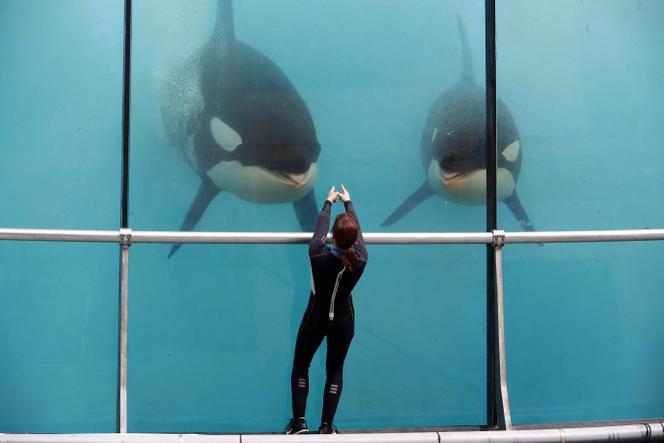


The fences hide a sensitive operation from view. The Marineland water park in Antibes (southern France) has been barricaded off since its annual closure to the public on Monday, January 8, and the arrival of a crane a few days earlier, to carry out relocation exercises on Tuesday with the three orcas held there, following the death of Moana, a 12-year-old male, on October 18. The park's management, which does not wish to comment on this operation, has made no secret in recent months of its intention to send the three marine mammals abroad, in anticipation of the ban on orca and dolphin shows that will come into force at the end of 2026, under the law to combat animal abuse passed in 2021.
For several months now, several animal protection associations, including C'est Assez! and One Voice, have been talking about a possible transfer to Japan, home to several aquatic parks, two of which are currently able to house orcas.
The arrival of a yellow crane at Marineland on Friday, January 5, confirmed a suspected departure, which would require heavy logistics (crane, XXL harness, transport by cargo plane, close monitoring). The prefecture confirmed that the crane was intended to carry out a "training session" to "gradually teach the orcas to return voluntarily, without stress, to a custom-made stretcher." However, the prefecture "denied the rumor that the resident orcas would soon be transported to Japan," confirming again on Tuesday that no application for an export permit had yet been submitted by the park's management.
The French Ministry of Biodiversity also denied any transfer is imminent. Transport of orcas from one zoo to another is governed by the Convention on International Trade in Endangered Species of Wild Fauna and Flora, and according to its rules, French authorities have to liaise with their foreign counterparts "to verify the conditions of transport, reception and accommodation" from the moment an export application is submitted.
However, the associations that have been present in Antibes for several days, monitoring the comings and goings of trucks and the movements of the crane, remain vigilant and are ready, if a request is officially filed, to appeal to the courts to prevent the orcas' departure for a country less protective than France, where the three orcas, which belong to the same family, could also be separated.
"The spirit of the law against animal abuse is not to send animals to countries with lesser protection standards, where they would be treated worse than here," argued Christine Grandjean, president of C'est Assez!, who is pleading for the three whales – which cannot be set free, having known nothing but captivity – to remain in Antibes, with their caretakers, until they die, or until a sanctuary can one day take them in.
You have 40% of this article left to read. The rest is for subscribers only.
